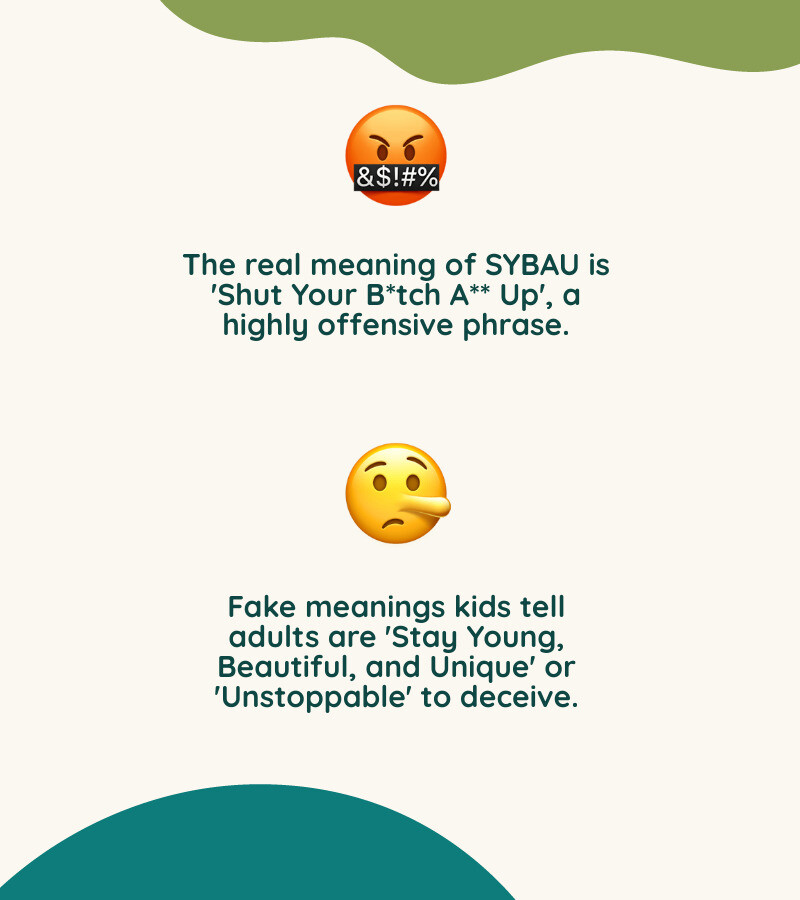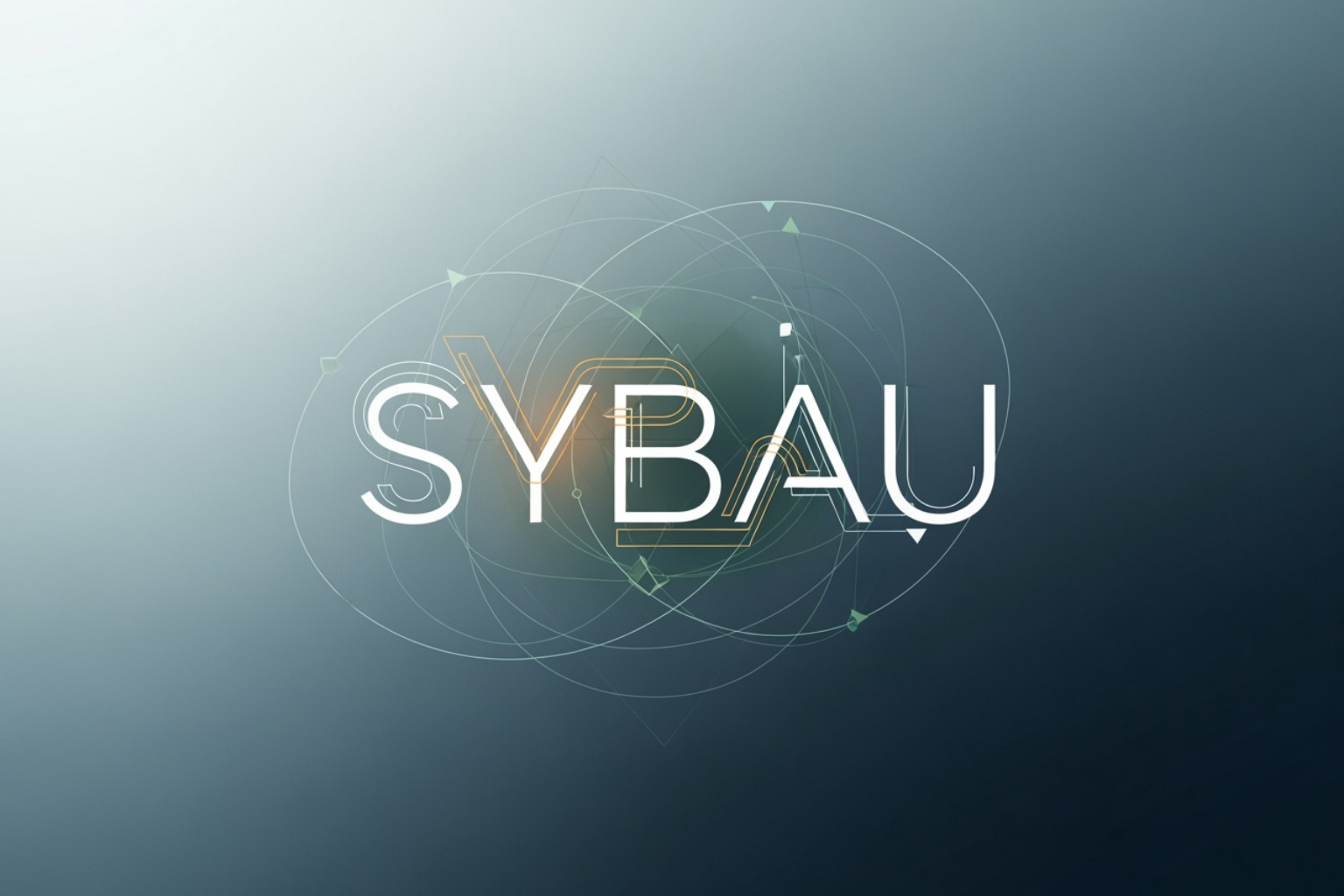sybau meaning: The Deceptive Truth for 2025
Understanding the Hidden Language of Teen Slang
Sybau meaning has become a hot topic among parents finding their kids using this mysterious acronym. Here’s what you need to know:
Quick Answer:
- Real meaning: SYBAU stands for “Shut Your Btch A* Up” – a vulgar phrase
- Fake meanings kids tell adults: “Stay Young, Beautiful, and Unique” or “Stay Young, Beautiful, and Unstoppable”
- Usage: Popular on TikTok, text messages, and social media comments
- Pronunciation: “see-bow,” “sigh-bow,” or “sea-brow”
If you’re a parent who recently heard your child say “SYBAU” and got a sweet, innocent explanation, you’re not alone. Kids across social media have turned this into an inside joke, deliberately misleading adults about what this acronym really means.
The term has exploded across platforms like TikTok, where teens flood comment sections with fake definitions whenever adults ask what it means. One parent shared how their teen responded to a safety text with “SYBAU,” claiming it meant something positive – only to find the harsh truth later.
This isn’t just harmless teen slang. SYBAU represents a concerning trend where kids actively deceive adults while using genuinely disrespectful language. Understanding what your children are really saying online has never been more important.

Easy * sybau meaning* glossary:
The Real SYBAU Meaning vs. The Deceptive Cover
Picture this: your teen texts you “SYBAU” after you remind them about their curfew. When you ask what it means, they sweetly reply, “Oh, it just means ‘stay young, beautiful, and unique,’ Mom!” You might feel touched by this seemingly positive message. Unfortunately, you’ve just become part of a widespread deception that’s happening in households everywhere.
The sybau meaning phenomenon represents something much more complex than typical teen slang. Unlike other acronyms that simply evolve naturally, SYBAU comes with a deliberate smokescreen designed to fool adults. This isn’t just miscommunication – it’s strategic misdirection.

What makes this particularly concerning is how teens have turned lying about language into entertainment. They’re not just using slang – they’re actively deceiving the adults who care about them. This creates a double problem: disrespectful communication hidden behind outright dishonesty.
What Does SYBAU Actually Stand For?
Here’s the truth that teens don’t want you to know: SYBAU stands for “Shut Your Btch A Up*.” Yes, it’s exactly as vulgar and offensive as it sounds.
This isn’t mild teenage rebellion or harmless slang. It’s a direct, aggressive command meant to silence someone in the rudest way possible. When your child uses this term, they’re essentially telling you to shut up using profanity that would likely get them in serious trouble if you understood it.
The acronym functions as a digital disguise for language that most families wouldn’t tolerate in face-to-face conversation. It’s designed to be dismissive, insulting, and disrespectful – especially when directed at parents or other authority figures.
Understanding this sybau meaning is crucial because it reveals how teens can hide inappropriate language in plain sight. They’re counting on adults not knowing what these letters really represent.
The “Nice” Meanings Kids Use to Trick Adults
Now comes the really frustrating part. When adults find SYBAU and ask about it, teens have prepared a whole arsenal of fake, wholesome definitions. The most popular cover stories include “Stay Young, Beautiful, and Unique” or “Stay Young, Beautiful, and Unstoppable.”
These fabricated meanings aren’t accidental mix-ups. They’re carefully crafted lies designed to make adults feel silly for questioning such a “positive” message. Imagine asking your teen about their language and being made to feel like the bad guy for not appreciating their “inspirational” acronym.
This deception has become an inside joke across social media platforms. Teens actively coordinate to give adults false information, treating it like a game where parents are the unwitting participants. When adults ask about sybau meaning online, comment sections fill with teens offering these fake definitions while laughing at the adults who believe them.
Kids deliberately lie about the meaning of ‘SYBAU’ to adults, providing fabricated positive definitions. They’re driven by wanting to maintain their inside joke and playfully label adults as out of touch for not knowing the real meaning.
This isn’t just harmless fun. It represents a concerning trend where children normalize both disrespectful language and deliberate dishonesty toward the adults who care about them most.
SYBAU in the Wild: Usage, Pronunciation, and Context
Now that you know the real sybau meaning, let’s explore how this term actually shows up in everyday digital conversations. Just like understanding market trends helps you steer financial decisions, recognizing where and how teens use this slang can help you better understand your child’s online world.

How and Where is SYBAU Used?
SYBAU thrives in the digital spaces where teens spend most of their time. You’ll find it popping up in comment sections across TikTok, X (formerly Twitter), and Instagram, where it serves as a quick way to dismiss or shut down someone’s opinion. The term also appears frequently in direct messages between friends and, unfortunately, in conversations with parents.
The real-world examples paint a concerning picture. On X, users deploy “SYBAU” to defend their favorite K-pop groups or shut down criticism. One TikTok user casually dropped it into a conversation about house rules, showing how normalized the term has become in everyday banter.
But here’s where it gets particularly troubling for parents. One dad shared his confusion when he texted his teenage son to “be safe with your friends,” only to receive “SYBAU” as a response. The father initially thought it meant something positive like “stay young, Black, and unique” – exactly the kind of deception we discussed earlier.
Another parent finded the truth when a teen commented “SYBAU” under his social media video. He had no clue what it meant until he looked it up later, highlighting how easily this disrespectful language can fly under adult radar.
The term isn’t confined to digital spaces either. Kids are using SYBAU at school, at home, and anywhere they want to express dismissal without immediate consequences from adults who don’t understand the sybau meaning.
How Do You Pronounce SYBAU?
Even pronunciation varies among teens, which adds another layer of confusion for parents trying to keep up. The most common ways to say SYBAU include “see-bow,” “sigh-bow,” and “sea-brow.”
This variation is typical of internet slang that spreads organically through social media rather than formal instruction. Your teen might say it one way while their friend says it completely differently – and they’re both “right” according to their social circles.
The Origin and Evolution of SYBAU
Like most internet slang, SYBAU didn’t appear overnight. It evolved from earlier acronyms like “STFU” (Shut The F* Up), which has been around since the early days of online chat rooms. The addition of “bitch ass” makes it significantly more vulgar and disrespectful than its predecessor.
Social media platforms, especially TikTok, act as accelerators for this kind of linguistic evolution. What starts as an inside joke among a small group can explode into widespread usage within days. For Gen Z, these exclusive terms serve a dual purpose: they create a sense of belonging within their peer group while simultaneously excluding adults from their conversations.
This generational language gap isn’t new, but digital communication has dramatically sped up the process. Terms that might have taken months to spread through schools now go viral in hours, leaving parents scrambling to decode their children’s latest expressions.
Understanding these digital trends requires the same attention to detail you’d need when following cryptocurrency markets – the landscape changes rapidly, and staying informed is crucial for making good decisions.
A Parent’s Guide to Navigating Teen Slang
Learning to understand teen slang feels overwhelming, especially when terms like SYBAU are deliberately designed to deceive us. As parents, we need the right tools to bridge this communication gap – much like how we provide comprehensive guides on complex topics, from Fintechzoom.com Money Complete Guide to a Fintechzoom.com Crypto Ultimate Guide.
The key is approaching these conversations with patience and understanding, rather than immediate frustration.
Why the Use of SYBAU is a Concern for Parents
When your child uses SYBAU, it’s not just “kids being kids.” The true sybau meaning creates several serious problems that we can’t ignore.
The disrespect factor is the biggest red flag. At its core, telling someone to “shut your btch a* up” is profoundly aggressive and dismissive. When our children use this language – especially toward us or other adults – it shows a complete breakdown in respectful communication.
The lying aspect makes it even worse. When kids deliberately tell us SYBAU means “stay young, beautiful, and unique,” they’re actively choosing deception over honesty. This teaches them that lying is an acceptable way to avoid consequences, which can seriously damage family trust.
The communication gap this creates is heartbreaking. Instead of having open conversations with us, our children are using coded language to express defiance. This prevents the honest dialogue we desperately need to maintain strong relationships with our teens.
The emotional impact on parents shouldn’t be overlooked either. Being told to “shut your btch a* up” – even in disguise – hurts. While teens might think it’s hilarious, we’re left feeling disrespected and frustrated.
SYBAU is widely viewed as a negative and disrespectful term. While some slang can be harmless fun, experts agree that ‘SYBAU’ crosses a line due to its disrespectful nature and the way it encourages lying.
How to Talk to Your Kids About the sybau meaning
Finding the real sybau meaning can feel like a punch to the gut. Your first instinct might be anger – and that’s completely understandable. But taking a deep breath and approaching this thoughtfully will get much better results.
Start with genuine curiosity instead of accusations. Ask your child where they first heard the term and who uses it. Most importantly, find out what they think it means. This creates a safe space for honest conversation rather than defensive walls. Experts recommend starting by gathering information from your child when discussing slang.
Keep your cool, even when it’s hard. It’s helpful to try to understand your child’s perspective and avoid an immediate angry reaction when addressing potentially offensive language. Your calm response will encourage them to keep talking rather than shutting down completely.
Help them develop empathy by asking how they’d feel receiving that language. Would they want their teacher hearing them say that? How about their grandmother? This gentle questioning helps them see beyond their own perspective.
Explain the real meaning clearly but calmly. Don’t sugarcoat it – they need to understand exactly why SYBAU is offensive and unacceptable. Use this as a teaching moment about the power of words.
Make the distinction between harmless and harmful slang. Not every teen expression is problematic. Help them understand the difference between playful language and words that are disrespectful, vulgar, or deceptive. The goal is to support your child’s use of harmless slang while guiding them to understand the impact their words have on others.
Set crystal-clear boundaries about language expectations in your home and online. Emphasize that freedom of expression comes with responsibility and respect for others.
Keep these conversations ongoing. Teen slang evolves constantly, just like staying current with topics like Fintechzoom.com Natural Gas or Fintechzoom.com Nickel Guide 2025. It’s important to have ongoing conversations with your children about the difference between harmless fun and offensive language.
You’re not just banning a word – you’re teaching respect, critical thinking about language, and the importance of honest communication. These lessons will serve them well beyond their teenage years.
SYBAU vs. Other Slang: Clarifying Confusion
The world of internet slang can feel like a confusing puzzle, especially when different terms sound almost identical. If you’ve been scratching your head trying to figure out whether SYBAU is the same as other similar acronyms, you’re not alone. Let’s clear up the confusion once and for all.

Think of it like learning the difference between similar financial terms – just as you wouldn’t want to confuse a crypto wallet with a traditional bank account, understanding these slang distinctions matters for effective communication with your teens.
Is SYBAU the Same as SYAU?
Here’s where things get interesting. SYBAU and SYAU might sound like cousins, but they’re more like distant relatives with very different personalities.
SYAU actually has a split personality. On one hand, it can mean “Shut Your Ass Up” – which puts it in the same vulgar family as our sybau meaning. It’s still a rude command to silence someone, though arguably not quite as harsh as “shut your btch a* up.”
But here’s the twist that makes SYAU particularly tricky: it also serves as internet slang to express surprise or astonishment. Picture this – your teen finds out their favorite artist is dropping a surprise album and exclaims “Syau!” It’s like saying “wow!” or “no way!”
So while the sybau meaning stays consistently vulgar and aggressive, SYAU could either be telling someone to shut up or expressing genuine excitement. Context is everything with this one.
Unrelated Words That Sound Like SYBAU
Now for a fun linguistic detour that shows just how tricky similar-sounding words can be. Several words from other languages might fool your ears, but they have absolutely nothing to do with the sybau meaning.
Take сыбар (sybar) from Turkic languages like Bashkir and Yakut. In Bashkir, it describes something “variegated, motley, speckled, mottled, or dappled” – basically, something with mixed colors or patterns. In Yakut, it simply means “thicket.” Pretty far from “shut your btch a* up,” right?
Then there’s sabaw, which has multiple meanings depending on where you are. It’s a Kachin family name from Burma meaning “rich or prosperous.” In Filipino, it literally means “soup,” but as slang, it describes someone whose brain isn’t functioning properly – like saying “my brain is soup” when you’re exhausted.
Sayu from Indonesian brings us into completely different emotional territory. It means “very sad and touched,” “sad and pleading,” or describes something listless and gloomy. It’s actually quite poetic compared to the harshness of SYBAU.
For a truly unique example, syaw exists in the fictional Na’vi language from Avatar, where it simply means “call.” Even fictional languages can create confusion!
These examples perfectly illustrate why context and origin matter so much in language. Just because something sounds similar doesn’t mean it shares the same meaning – a lesson that applies whether you’re deciphering teen slang or understanding complex digital topics.
Conclusion
Finding the true sybau meaning has been quite a journey, hasn’t it? What started as confusion over a seemingly innocent acronym has revealed a much deeper story about how kids communicate online today. We’ve uncovered that SYBAU actually stands for “shut your btch a* up” – a stark contrast to those sweet, made-up definitions like “stay young, beautiful, and unique” that teens love to share with unsuspecting adults.
This whole phenomenon really highlights something bigger than just one slang term. It shows us how digital communication creates these invisible barriers between generations, where kids can use offensive language right under our noses while we think they’re being positive and uplifting.
The deception aspect is what makes SYBAU particularly concerning. It’s not just about using vulgar language – it’s about actively lying to parents and teachers about what that language means. When your child responds to your safety text with “SYBAU” and then tells you it means something beautiful, that breaks down the trust that healthy family communication depends on.
But here’s the thing – understanding these trends doesn’t have to be overwhelming. Approaching conversations about sybau meaning with curiosity rather than anger opens doors instead of slamming them shut. When we take time to listen first and guide second, we help our kids understand why their words matter and how they affect the people around them.
The key takeaway? Not all slang is created equal. Some teen language is harmless fun that helps kids feel connected to their peers. But terms like SYBAU cross the line into disrespect and dishonesty. Learning to tell the difference – and helping our children understand that difference too – is one of the most valuable digital literacy skills we can develop as families.
Staying informed about these rapidly changing online trends might feel like trying to hit a moving target, but it’s worth the effort. Just as we work to understand complex financial markets or cryptocurrency developments, keeping up with digital communication helps us stay connected to the young people in our lives.
For more comprehensive guides on understanding modern digital topics and navigating the ever-changing online landscape, we invite you to explore more guides on modern digital topics.







